Anti-Conquest Bread Co
In the summer of 2021 I had the good fortune to be invited to America to lead several bread making workshops and build a handful of wood fired ovens. At the end of my 3 month trip I was in New York City, with only one thing on my mind – a visit to one of the newest and most talked about bakeries in the city, AntiConquest Bread Co in Brooklyn.
I had discovered the bakery and its baker, Tyler Lee Steinbrenner, through Instagram. I was searching for the best bakeries and his bread photos, showing deep caramelised crust and a hearty crumb, reminded me of the rustic hearth loaves I had baked and eaten all over Europe.. Among the thousands of IG crumb shots, Tyler’s bread demanded my attention and aroused my taste buds.
One of my first DMs to him was “The least Tartine style bread ever!” To which he replied “Hahahhaa, the open crumb thing is crazy to me.” That was the clincher. Bread goals, not big holes!! We were both cut from the same piece of dough. So at the end of August I found myself walking across Brooklyn Bridge for the first time, transfixed by the view of Manhattan and the East River. I decided to walk because I wanted to visit some of the actual locations from my favourite film 'Once Upon a Time in America'. Forty years ago Sergio Leone chose Brooklyn Heights because of its run down period buildings; now this area is the hip vibrant DUMBO district. I found the actual spot where Dominic was shot by Bugsy and it was remarkably similar apart from the renovated warehouses that were now coffee shops, record shops and boutiques.
Further south is the ultra cool Carroll Gardens area, where the bakery is located.
It opened in 2020 during lockdown as a low key microbakery baking bread for a number of mutual aid and social projects, primarily helping to feed some of the thousands of unemployed hospitality workers.Very quickly customers beat a path to his door – he doesn’t really have a shop, just a repurposed 15 square metre kitchen. Asdemand increased he ran a very successful crowdfunding campaign allowing him to purchase some professional baking equipment, including a deck oven and a mixer. Prior to this he was baking a couple hundred of his signature sourdough boules each day in a rotating stack of 25 dutch ovens. Do not try this at home!!
Mid-afternoon, I knocked on an unassuming door; the only thing that gave it away was the glorious smell of fresh bread all about.The door opened and I was warmly welcomed into the wonderful world of ACQ Bread. Tyler apologised that he just had to finish emptying the oven; whilst he did this I browsed the bookshelves for clues to his bread making heroes. There were few books – a very good sign – but two immediately caught my eye, Alan Scott’s The Bread Builders (an indispensable book) and one I had not seen before, a well thumbed copy of The Conquest of Bread by Peter Kropotkin. I was intrigued.
Tyler is one of the new wave of chef bakers who have revolutionised the artisan baking movement over the past twenty years. At the tail end of the 20th Century, around the world the craft baking industry was in terminal decline due to the combined pressures of changing shopping habits and industrial bakeries. As cost pressures mounted craft bakeries cut wages and training, until a night shift in a small local bakery was almost purgatory, much like that of the ground down groaning “greindre” in a 18th C Parisian bakehouse. Ironically chefs turned to baking as an alternative to the highly pressurised world of fine dining restaurants. They came without the “we’ve always done it this way” mentality of old school bakers taught on the job or in old fashioned baking colleges, to them sourdough was unheard of, bakers yeast did the job much quicker, and without all the hassle of feeding and maintaining a starter. They also brought optimism and a derring do. They were the long overdue refreshment to a levain that had long since stopped leavening.
After originally studying painting at the prestigious Rhode Island School of Design Tyler soon found himself in the hospitality industry. “I realised food was art, and much more interesting and honest.” His career as a chef was impressive, working at the 3 Michelin star Atelier Crenn making their famous poetic culinaire brioche. He moved to New York to become a “fermentalist” at ASKA (ashes in Swedish) where he dived deeply into the trendy world of fermentation. But when COVID came he was laid off – his ASKA world reduced to ashes. It was at this point that he became a bread baker.
He was determined to move far from the rarified and privileged world of fine dining and molecular gastronomy. “Food has to be made by your neighbour in order for there to be any semblance of ethics and morality in the colosseum of commerce” he told me. The bakery could be most likened to an old fashioned anarchist bookshop in its ethics and business model. This is straight out of Kropotkin’s book (1892), which is a classic of political anarchist literature. It heavily influenced the Occupy movement. It proposes a decentralised economic system based on mutual aid and voluntary cooperation. The book barely mentions bread, but does discuss the idea of communalism in agriculture. Many critics argue the book is a utopian dream. Tyler appears to be putting Kropotkin's theory into practice.
He is wedded to the idea that the consumer should be connected directly to the baker, something he learnt from chef Dominique Crenn, who in her book Metamorphosis of Taste wrote of her brioche “it is so luscious and luxurious that you feel connected to the person that makes the bread.” Her mantra was THINK BEFORE COOKING; Tyler’s is THINK BEFORE BAKING. He hopes that the world has woken up to the fact that the humble loaf (not the $20 brioche) is not a single commercial transaction between baker and consumer but an act of economic and environmental responsibility. To paraphrase Wendell Berry, “baking is an agricultural act”.
Alan Scott, the great grandfather of the modern artisan bread movement wrote of a “deeply rooted agrarian bread culture”,and said “I feel much more secure now about the how and why of the bread I bake, and about who I bake it for….I hope that this valuable knowledge and the skills to implement it will add substantially to our capacity to serve our families, friends and communities”.
It is as if Tyler’s bread is built with a levain fed on the vision of Kropotkin, and flour and water provided by Scott. In reality Tyler has used his skills as a fermentalist to create a number of unique levains, and uses his local farmers and millers for all his key ingredients. So what does this magic combination create?
Standing in the bakehouse he sliced into some of the previous day's bread. Warm bread is the most beguiling and primal olfactiory experiences; research has shown a Pavlovian response triggers memories AND emotions. Respondents very often talk of ‘home’, ‘mother’, ‘childhood’ and ‘grandparents’. We all love the smell, feel and taste of warm bread, but bakers know that the complex taste can be best experienced in aged bread, just like wine.
Tyler picked up a hearty loaf and cut into it as reverently as a Catholic priest pierces the bread during the secret eucharistic liturgy, a sacred act which transforms the simple bread into the actual flesh of Christ. What transformation was openly taking place before me? Was I partaking of a loaf or a sacrament?
Bread must be savoured. For me it is a sacred and scientific experience best accompanied only with water. I first smell the soft fleshy crumb, squeezing the crust to release the aromas whilst listening to the sound it makes. My first mouthful is always the crumb and crust combined, to experience the balance of the crumb’s sugars released by fermentation and the crusts' bitter notes created by the Maillard reaction. If a loaf is well caramelised then the nutty notes perfectly complement the sweet inner flesh, and during prolonged mastication the heart of the loaf is revealed.
Only then will I taste the crust and crumb separately to discover more about the grain, the type and amount of levain used (God forbid there is any yeast), the hydration and the fermentation. After 3-5 minutes of meditation and reflection, I am then ready to proffer any observations.
Tyler offered me a slice of his classic sourdough boule, the one that had fed his hungry friends during lockdown. After a few minutes he hesitantly enquired "well?"
“I think that is quite possibly the best bread I have tasted in several years, if not ever.”
Anyone who knows me knows that I am opinionated but not given to hyperbole. But we had only known each other for thirty minutes and Tyler appeared taken aback by my praise. Emboldened, he cut into another loaf, his Shokupan milk bread. I am generally a bread purist and often shun bread with unnecessary additional ingredients, for me a baker's job is to coax the full flavour and texture from any given grain. Childhood memories of my Grandfather’s ration era recipe for milk bread from skimmed milk powder, yeast and sugar filled my mind.
“Try this one.”
Tyler’s milk bread tasted not just from a different generation but from a different planet. My befuddled brain could not make sense of the multitude of tastes, smells and textures. Sweet not sugary, savoury not salty, soft not fluffy, lactic not sour. As I devoured more of this manna from heaven I asked him what magical combination of ingredients and craft had created such a thing of beauty. My Grandfather's bakers would compare a perfectly proved piece of dough to an ‘angel’s pillow’, and here was the actual taste of an angel.
He was rightly reticent to give away his hard won secrets, and his work schedule precluded a long and thorough explanation. But in short he has used his skills as a fermentalist to create a levain containing the resin of young Japanese pine cones, and his baker’s craft to hand mix and ferment a dough made from locally grown freshly milled flour. He starts with a Tangzhong roux made with Thai sticky rice flour, egg yolks, flour and milk. It is blended and added to the levain, then mixed into an autolysed dough. Yes it is a complex process, resulting in a complex taste and texture. But as we talked more I realised that the most important ingredient was his intention, something intangible like my Grandmother’s secret ‘Granny powder’ that always made her cakes taste so heavenly.
“I don’t compromise on anything”, he told me, and he continued “I literally just care about my bread like it is a living thing"
He sounds like a man on a mission, intensely focussed like a young Chad Robertson on making the perfect loaf. But he also cares deeply about his community, ‘Bread is,’ he says, ‘the ultimate denominator food in America,’ and although he charges $12 a loaf he is committed to helping those less well off in his community eat good bread. He tells me “The uniqueness of bread is that with the simplest of ingredients one can make transcendent and edible objects through compassion and craftsmanship”
Tyler may well have digested the The Bread Builders and the Tartine books, but his ultimate guide to baking is Kropotkin’s The Conquest of Bread. I arrived at the bakery perplexed at its name, but leaving after less than an hour in his company the mystery began to unravelI left the bakery feeling humbled, inspired and optimistic. I had ended my bread trip with what can only be described as a pilgrimage. Seventeenth century French bakers used the word ‘exalte’ to describe the perfect point in fermentation when a loaf is ready to be baked/sacrificed. As I walked over the Brooklyn Bridge at dusk, Wall Street in front of me, I felt exalted too. New York City, the temple of Commerce, the home of the cronut, and yet there still existed a space for an idealistic and talented anarchist baker to ply his trade.
His words rang in my ears:“My goal is to make something so undeniably good that it doesn’t need the justification of capitalism to justify its existence.”
At the moment there is no paid subscription. You can subscribe to read more of my writing here.
Please let me know about other similar small bakeries baking similar breads around the world. Have you eaten Acq Bread?
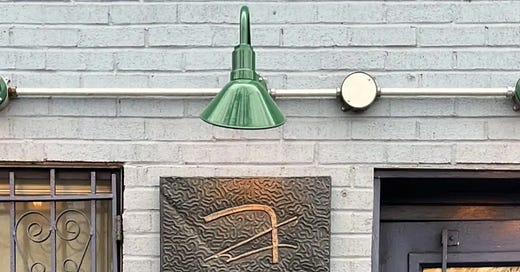



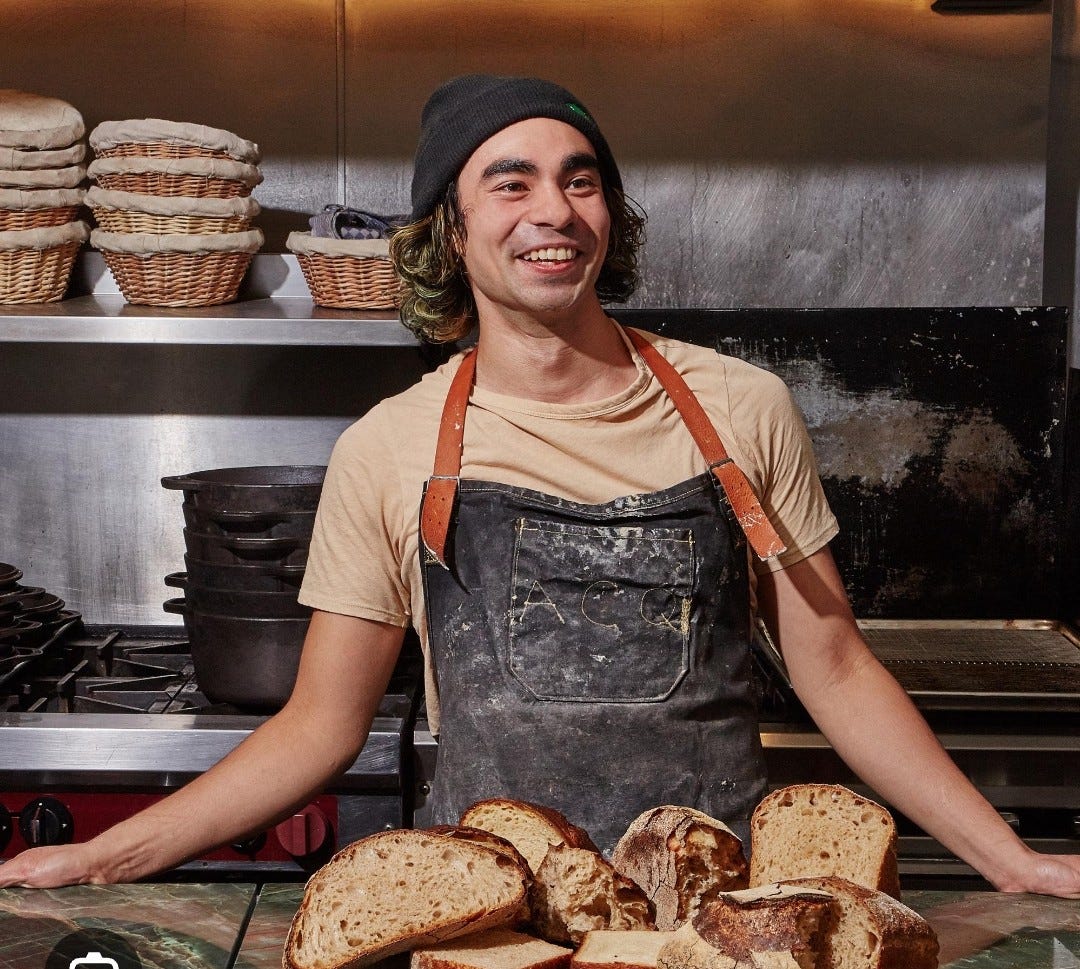
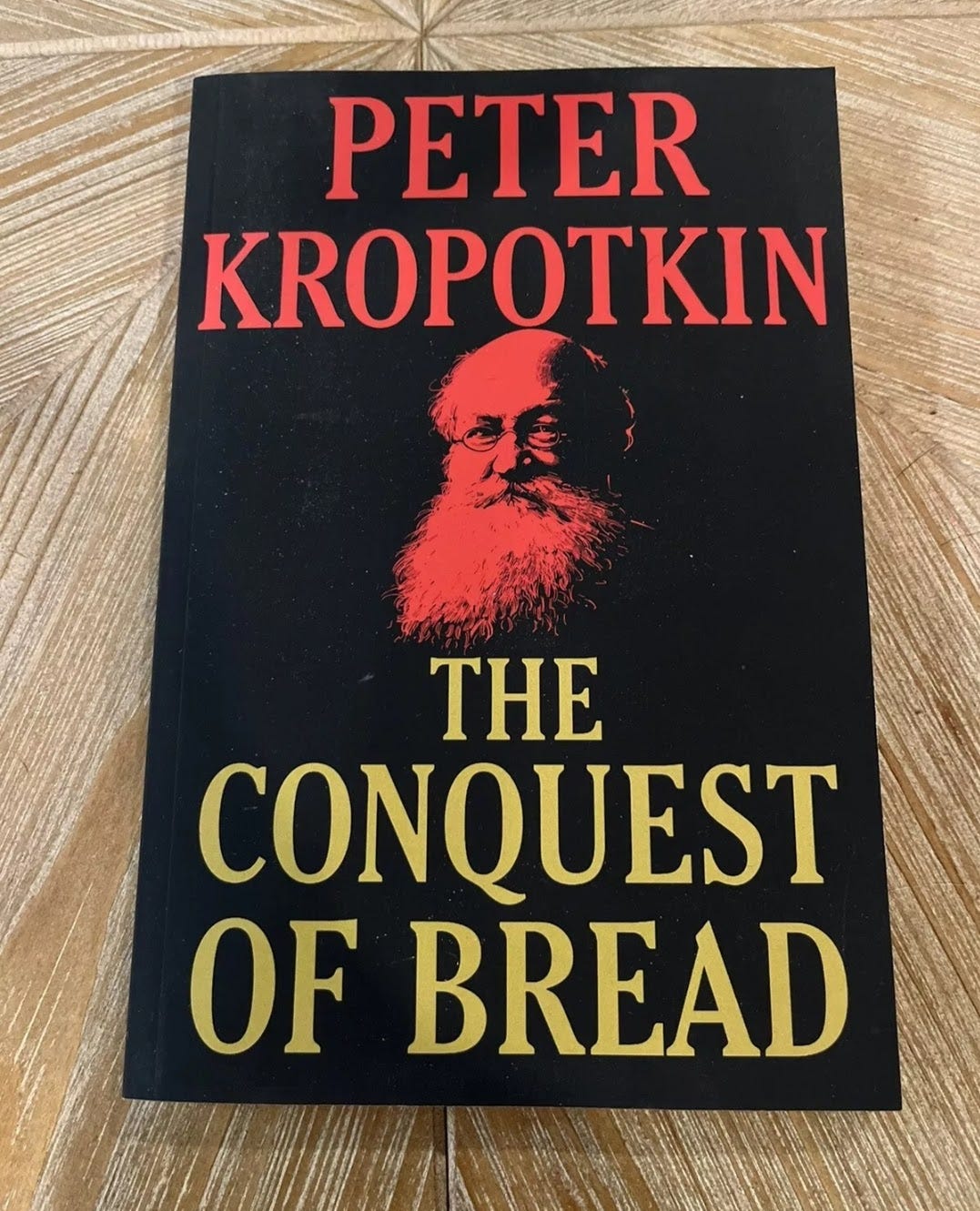
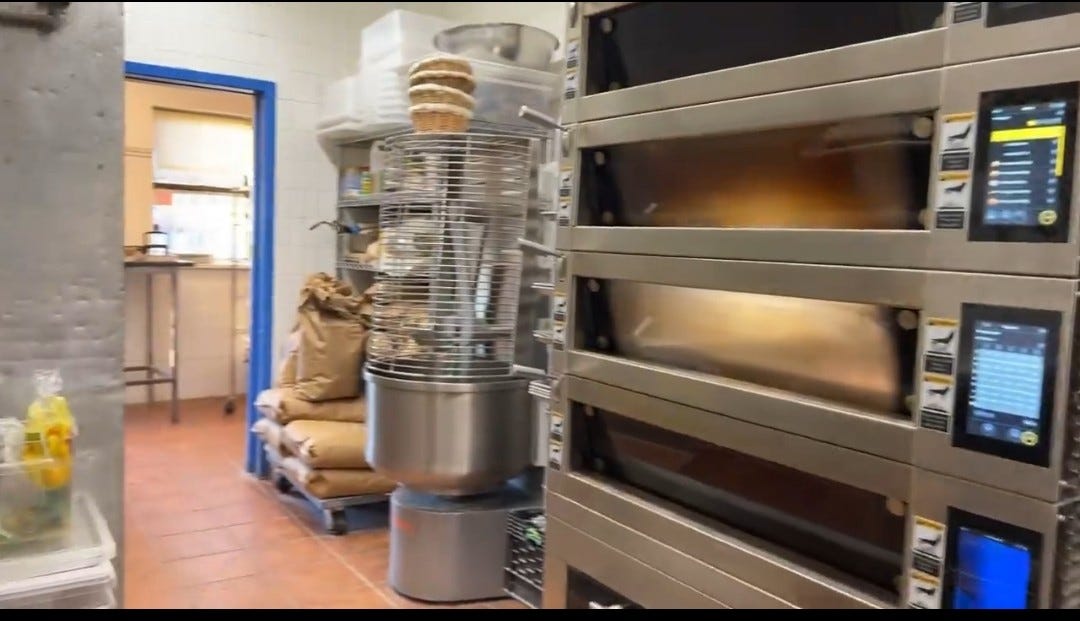
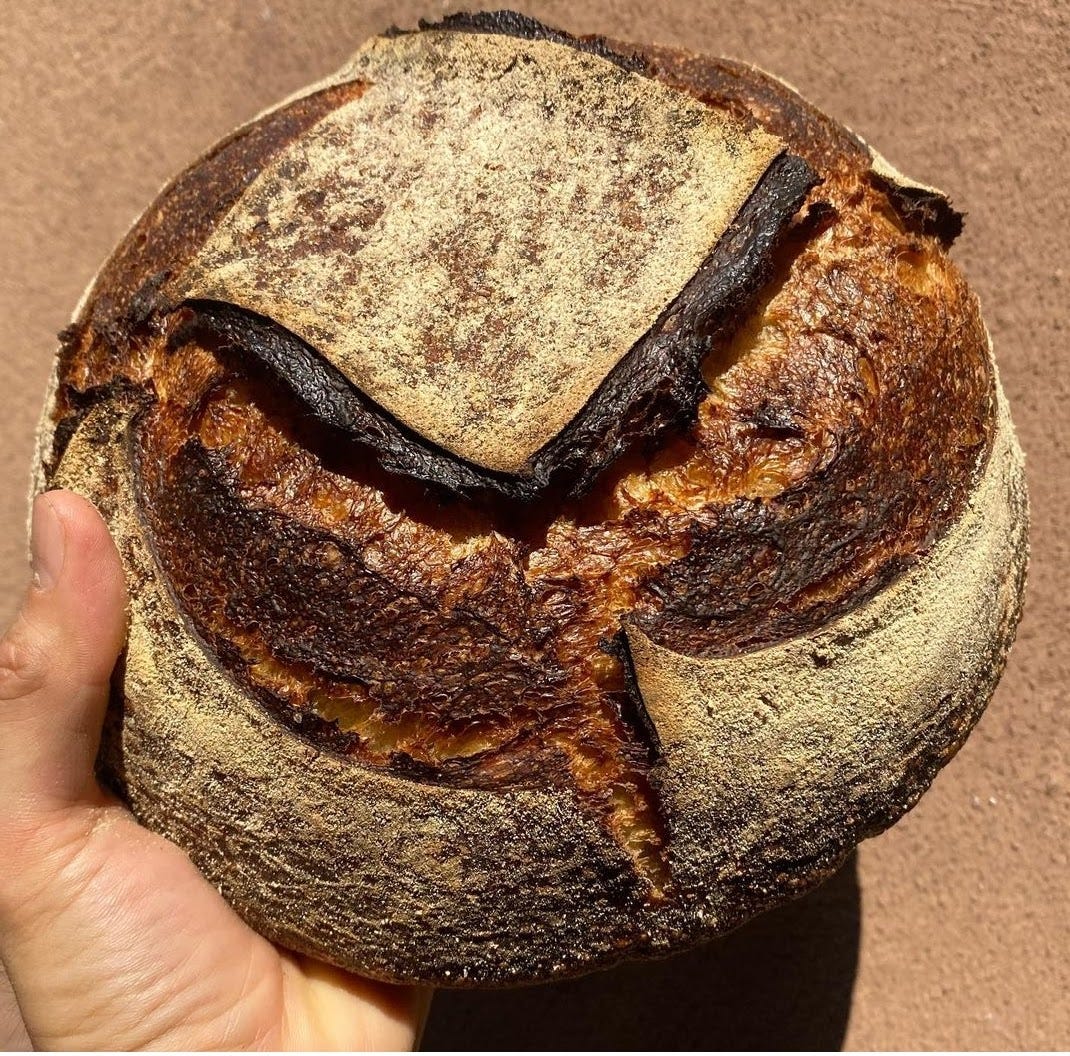
why am i on the verge of tears right now